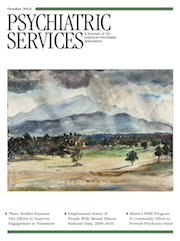To the Editor: Diets high in calories and saturated fat and poor in fiber and fruit contribute to the development of obesity and chronic health conditions among people with schizophrenia (
1). Providing information on healthy diets may help these individuals develop more healthful behaviors that may lead to weight maintenance or loss (
2). Such information would outline the benefits of and barriers to behavior change and boost an individual’s confidence to eat healthfully.
Research shows that individuals with schizophrenia turn to the Internet for health information and that use of online psychoeducational resources has clinical benefits (
3). Although online health information for this population is easily accessible, it is of poor quality and written at a high reading level (
4). Web sites that offer dietary information for individuals with schizophrenia have not been evaluated.
This review examined the theoretical and technical quality and reading level of online dietary information for the purposes of helping people with schizophrenia lose weight. Methods used in a previous study (
4) were used to find and evaluate Web sites. The following search terms were used: schizophrenia, diet, weight, obesity, eat, food, and nutrition. Combinations were entered in Google, and the first four pages of links were examined. Web sites were included if they provided information in English on eating behaviors for the purposes of losing weight for people with schizophrenia. Included sites were evaluated by two reviewers (PG and HP) for Web site characteristics (information source, clicks to reach content, and presence of discussion or comment boards), accuracy (dietary recommendations, such as lowering food and beverage intake and following dietary guidelines), technical quality (
JAMA quality standards), and theoretical quality (knowledge dissemination and cognitive and behavioral strategies). Nutritional information was evaluated by using a method devised by Ostry and colleagues (
5).
Overall, 13 Web sites met inclusion criteria. [A list with links to the main domains of each site is available in an online
data supplement.] Most sites were designed by independent sources (N=8), such as bloggers. It took an average of four clicks to find the desired content, and nine sites provided discussion or comment boards. No sites recommended that individuals eat a variety of foods from different food groups, and fewer than half (N=6) mentioned limiting foods and beverages high in calories. Few recommended choosing lower-fat dairy products (N=1) and leaner meats (N=2). Seven had high technical quality scores for authorship information, reference use, information currency, notification of disclosures and endorsements, and contact information. Most sites (N=12) scored poorly on theoretical quality, indicating a lack of any behavioral theory and knowledge dissemination strategies. The average reading grade as assessed by the Flesch-Kincaid Readability test was 11.9, well above a recommended grade of 6–8.
Online dietary information for individuals with schizophrenia needs to be improved because current content is based on poor dietary recommendations, not supported by behavioral theory, and written at a high reading level. There is a need for well-designed Web sites with information based on current evidence of how persons with schizophrenia can limit weight gain, lose weight successfully, and reduce the risk of life-shortening chronic illnesses.
Acknowledgments and disclosures
Funding for this study was made available through a postdoctoral fellowship at the Centre for Addiction and Mental Health.
The authors report no competing interests.

